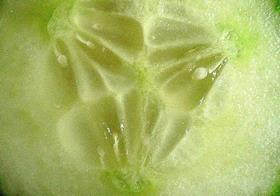
In the wake of an E.coli bacteria outbreak linked to Spanish cucumbers which has so far reportedly led to the death of 14 people in Germany and more than 300 taken ill across a number of European countries, Russia has taken the drastic step of banning all vegetable imports from both Germany and Spain.
Austria is also reported to have banned all sales of cucumbers, tomatoes and aubergines grown in Spain, while Belgium confirmed it was also blocking sales of Spanish cucumbers.
According to the Associated Press, Russian officials have also warned that it could extend the ban to other European countries if a satisfactory explanation of how the outbreak came about is not forthcoming soon.
The country's consumer consumer protection agency, the Federal Service for Supervision of Consumer Protection and Welfare, said in a statement that the ban covered 'raw vegetables', including tomatoes, cucumbers and salad produced in Germany and Spain.
'This measure stems from the outbreak in Germany of the acute intestinal infection caused by Enterohaemorrhagic E. coli (EHEC),' the agency said in a statement.
Late last week, German officials said they had reason to believe that the deadly bacterial strain may have come from organic cucumbers imported from Spain.
'Moreover, in the coming hours, a decision may be taken to ban the import to or sale in Russia of vegetables produced in all EU countries,' the Russian statement added.
Agency chief and chief medical officer Gennady Onishchenko urged Russians to eat only locally grown vegetables, adding that all vegetables already imported from Germany and Spain would be seized.
'We are calling on the population not to purchase fresh vegetables from Germany and Spain,' Interfax quoted Onishchenko as saying. 'Let them purchase domestic products.'
Meanwhile, the latest reports quoting local authorities suggest 36 cases of suspected E. coli in Sweden, all of them in people who were recently in northern Germany.
A smaller number of cases have also been noted in the UK, Denmark, France and the Netherlands, all linked to recent travel to Germany.
However, Spanish authorities continue to maintain that there is no evidence the deadly outbreak has been caused by Spanish vegetables.
Spain's health minister Leire Pajin observed that no cases of E.coli infection have yet been reported within her country, and called on counterparts in Germany to provide definitive proof of what has caused the outbreak.
Germany's allegations 'create alarm and affect the producers of a country without any evidence,' she said.



